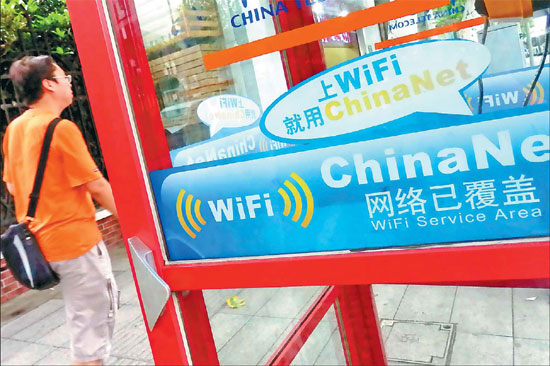Mounting calls for free access to Wi-Fi
Updated: 2012-10-03 07:13
By Eric Jou and Liu Qing (China Daily)
|
||||||||
|
A billboard promotes telecommunication and Internet connection in Beijing. Zhan Jun / For China Daily |
|
Major Chinese cities have been launching more free Wi-Fi hotspots for the public. Jing Wei / For China Daily |
Getting on the Net for free in urban areas with mobile devices may be just a click away, Eric Jou and Liu Qing report.
Cellular dead spots, Wi-Fi networking holes. In today's hyper-connected world, not being on the Internet for many people can be a lonely experience, perhaps akin to being stranded in the desert.
However, the fear of being disconnected may soon be at an end in major cities across China as the concept of a metropolis with free and open wireless connectivity becomes increasingly realistic.
There are more than 538 million users connected to the Internet in China, according to the analysis group China Internet Network Information Center, many of whom link to it through wireless devices. According to the research company IHS, the number of smartphone shipments within China this year is estimated to be 164 million. Whether all will be sold is another matter.
A smartphone has more advanced computing and Internet connectivity options than a regular-feature phone plus the ability to download a host of specialized applications.
With so many people using their phones to access the Internet, wireless connectivity has become a key issue in cities across the country.
Wang Boyan, 26, from Beijing, says he needs to be connected every day for his work as an engineer for China National Radio and consequently he's out of the office a lot of the time.
"I connect to the Internet a lot when I'm outdoors for things such as reading the news, using QQ or Weixin (chat programs) and searching for maps," Wang said.
"I think more Wi-Fi hotspots should be launched to increase the coverage rate as well as surfing speed."
Wang says his preference is to use Wi-Fi whenever possible because the speed is faster than connecting to the regular cellular network. While there are locations such as coffee shops and restaurants that offer free Wi-Fi as an incentive to get customers through the door, these services end once he or she leaves. Beijing only offers free Wi-Fi to the public in six downtown locations.
What Wang wants is a wireless city, one that provides wireless Internet to everyone within the city limits. Anyone with a Wi-Fi-capable device can connect to the free public wireless network offered by the city and, once connected, users can do whatever they normally do online. Many Chinese cities are currently working on becoming wholly wireless.
Edgar Figueroa, chief executive officer of the Wi-Fi Alliance, a trade association representing more than 520 companies in the Wi-Fi industry from around the world that also certifies products using Wi-Fi technology, says that China is very important for the Wi-Fi industry and the Wi-Fi industry is important to China.
At a recent Wireless China Summit, Figueroa said China has shipped more Wi-Fi capable smartphones than any country in the world. He also said Chinese telecom companies China Mobile, China Unicom and China Telecom have all committed to roll out about 1 million Wi-Fi hotspots across the country.
"We have been interested in investing in China for many years. Some of the progress we have made here is depicted in the Wi-Fi availability around the major cities in China," Figueroa said.
"Today many of the major cities in China have initiatives where they are rolling out Wi-Fi for public access."
In December 2011, the capital launched free Wi-Fi areas at which the public can access the Internet from their mobile devices. Citizens need only to connect to the "My Beijing" wireless network and then they will receive a text with instructions on how to get it.
According to the Beijing Economic and Information Technology Committee, the whole city will be covered with free high-speed Internet access in about three years and Beijing will build more than 200,000 wireless access points.
Like Beijing, the southern city of Guangzhou also launched public Wi-Fi in 2011. Guangzhou started developing the wireless city concept in 2008, aiming to cover the whole city with wireless technology, both cellular and Wi-Fi.
Wang Qimin, deputy director of the Guangzhou office of the State Information Center, said: "Wireless networks are the city's fifth public utility following water, electricity, gas and transportation."
The vice-mayor of Guangzhou, Gong Erzhen, said in 2011 that the project was designed to make Guangzhou a city with high-speed information technology with complete network coverage across the entire metropolis. As of 2011 Guangzhou offered 41 Wi-Fi hotspots, which are operated by China Mobile.
Earlier this year in Shanghai, China Telecom and the coffee chain Starbucks jointly put out free Wi-Fi hotspots across the city at more than 200 Starbucks locations. On top of that there are another 100 hotspots across Shanghai as part of the i-Shanghai project. Shanghai is expected to become a fully operational wireless city by 2015.
In Shanghai, as in other parts of China, wireless and transportation has become a hot topic. The Shanghai municipal government has been reported to be working on installing wireless access points at bus stops and, soon, buses.
Beijing, Hong Kong, Shanghai and Guangzhou authorities have added wireless devices to bus stops so people can check the status of their bus. Not only will passengers be able to access arrival times, should they happen to be on the bus they may be able to connect to the Internet. Currently in Shanghai more than 200 buses have Wi-Fi connections with more to come in the future.
Zhao Yu, an IT enthusiast in Shanghai, says he's excited to hear about the prospects of having WI-Fi on the bus.
"I take a bus and the subway to work daily," Zhao said. "I have a 3G plan but sometimes the connection isn't that great so, if they do offer Wi-Fi on the bus, it will make my commute more enjoyable."
Of course the ability to access the Internet brings about many risks that scare even the most enthusiastic of online addicts, such as Zhao. Security issues have been rampant with reports over the past few months relating to questionable wireless Internet security.
Many users of mobile Internet access are wary of public-provided hotspots. However, Figueroa says that Wi-Fi access points are among the most secure.
There is a protocol built into most Wi-Fi devices known as Wi-Fi Protected Access 2.
"WPA2 is government-grade level security. It has never been compromised and it is fundamental to every product that we have certified since 2005 so it's quite well protected," Figueroa said.
"Security is just like a seatbelt in your car: It's a method to be safe but you must engage it. We live in the wireless era. Wireless connectivity is really transforming our experience."
Contact the writers at Ericjou@chinadaily.com.cn.
|
With more people using their phones to access the Internet, wireless connectivity has become a key issue in cities across China. Yong Kai / China Daily |
(China Daily 10/03/2012 page1)














